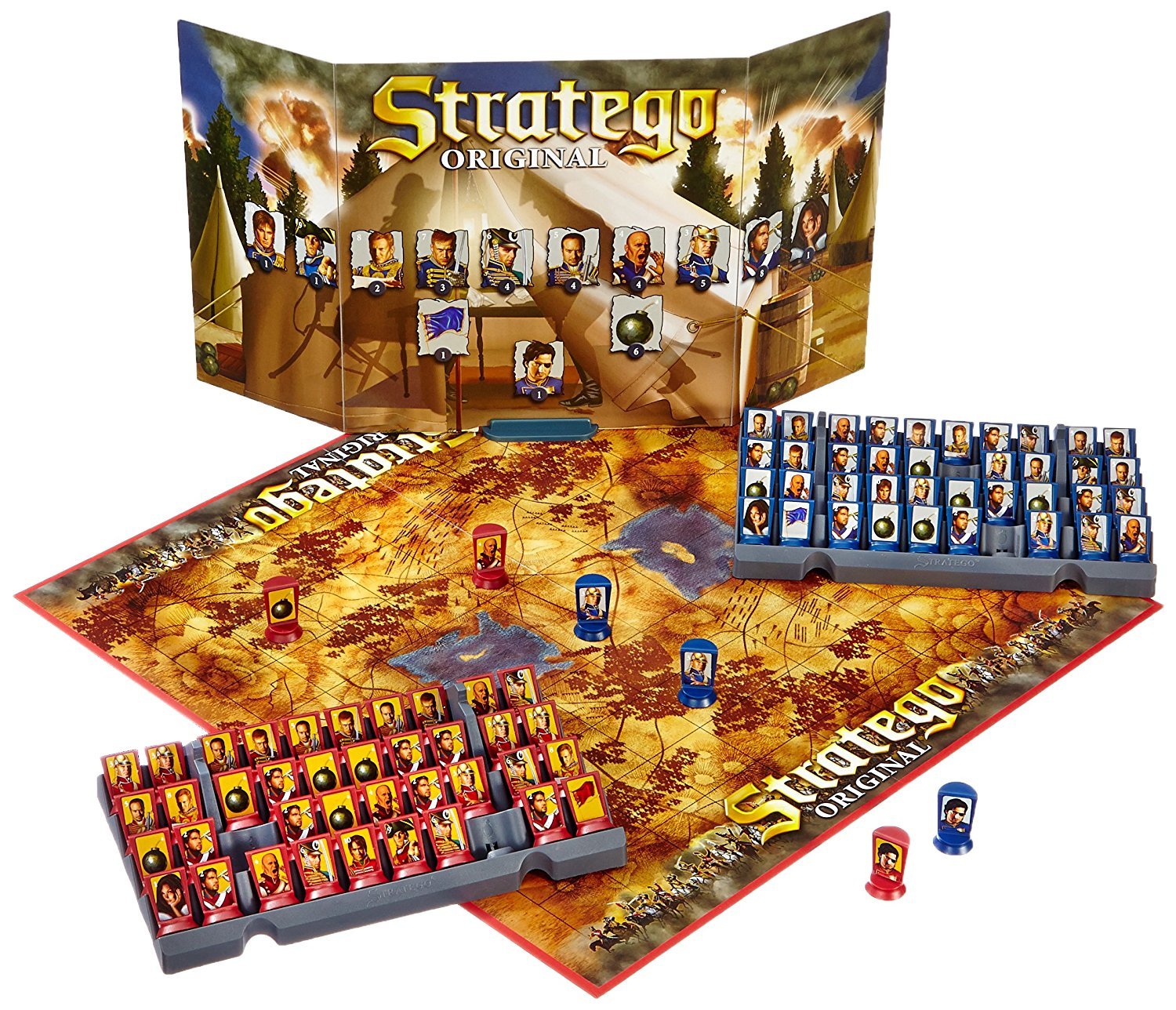

Weak, but Skilled: The three weakest pieces all have a special skill: the Miner defuses Bombs, the Scout can move any distance in a straight line, and the Spy kills the Marshal.Variant Chess: In a drawn-out endgame, the focus of gameplay can shift so heavily to clever manoeuvering that it almost resembles a game of chess.
 Taking You with Me: Without the optional aggressor advantage rule, this is how equal pieces fight.
Taking You with Me: Without the optional aggressor advantage rule, this is how equal pieces fight.  Stuff Blowing Up: There are six bombs per side. The Smurfette Principle: One version of the game has the Spy as a female. (Only a real schmuck would take this bait - once your Marshal has been revealed, your opponent will never deliberately put another piece next to it unless the Spy has its back). Schmuck Bait: Putting a high-ranking officer next to the enemy Marshal. If the Marshal strikes the Spy, though, the Spy goes down. The Only One Allowed to Defeat You: The Spy can capture the Marshal if he strikes first. Over the next few moves, the opposing player begins to make a "path" on the opposite side to the Marshal, then a single piece makes its way through. Overt Operative: Picture the scene, the Marshal has surfaced and is destroying everyone around him. Only Mostly Dead: The optional rescue rule. So they don't have much use on the opponents side of the field and are usually resigned to staying on your side and defend your own bombs against enemy Miners. Non-Action Guy: The Sergeants, Lieutenants and, to a lesser degree, Captains are likely to fall victim to this they are too low in rank to pose a credible threat to your opponent, but contrary to the Miners, Scouts and Spy, they likewise lack any special abilities to make up for it. Even if you've only got a handful of weak pieces left while your opponent still has most of his army, if you capture the Flag, you win. I Know You Know I Know: After the initial stages, each player will know the ranks of some of the other's pieces. Highly Specific Counterplay: The Spy's ability to capture the Marshall. (Of course, it's dangerous for them to get too aggressive because of the risk of hitting a bomb.) Frontline General: The Field Marshal and the General are the two most powerful pieces on the board, and are often placed on the front lines for this reason. Femme Fatale: One version of the Spy piece. When your opponent strikes one of the Bombs, he may believe your Flag is there and devote considerable effort to getting at it - thus buying you time to search for his Flag. When placing the pieces, it's standard procedure to put up a decoy Flag, usually a Sergeant or another low-ranking piece, also surrounded by Bombs. But for the Literal-Minded: The Flag is usually placed on the back row, surrounded by two or three Bombs. There is also an option where the defender does not have to declare their piece, only who wins. Faceless Goons: You can't see who's who on your opponent's side. Dastardly Whiplash: The usual Spy piece looks like one of these. Copy Protection: The video game adaptation provides the page image it falls under the "feelies" type.
Stuff Blowing Up: There are six bombs per side. The Smurfette Principle: One version of the game has the Spy as a female. (Only a real schmuck would take this bait - once your Marshal has been revealed, your opponent will never deliberately put another piece next to it unless the Spy has its back). Schmuck Bait: Putting a high-ranking officer next to the enemy Marshal. If the Marshal strikes the Spy, though, the Spy goes down. The Only One Allowed to Defeat You: The Spy can capture the Marshal if he strikes first. Over the next few moves, the opposing player begins to make a "path" on the opposite side to the Marshal, then a single piece makes its way through. Overt Operative: Picture the scene, the Marshal has surfaced and is destroying everyone around him. Only Mostly Dead: The optional rescue rule. So they don't have much use on the opponents side of the field and are usually resigned to staying on your side and defend your own bombs against enemy Miners. Non-Action Guy: The Sergeants, Lieutenants and, to a lesser degree, Captains are likely to fall victim to this they are too low in rank to pose a credible threat to your opponent, but contrary to the Miners, Scouts and Spy, they likewise lack any special abilities to make up for it. Even if you've only got a handful of weak pieces left while your opponent still has most of his army, if you capture the Flag, you win. I Know You Know I Know: After the initial stages, each player will know the ranks of some of the other's pieces. Highly Specific Counterplay: The Spy's ability to capture the Marshall. (Of course, it's dangerous for them to get too aggressive because of the risk of hitting a bomb.) Frontline General: The Field Marshal and the General are the two most powerful pieces on the board, and are often placed on the front lines for this reason. Femme Fatale: One version of the Spy piece. When your opponent strikes one of the Bombs, he may believe your Flag is there and devote considerable effort to getting at it - thus buying you time to search for his Flag. When placing the pieces, it's standard procedure to put up a decoy Flag, usually a Sergeant or another low-ranking piece, also surrounded by Bombs. But for the Literal-Minded: The Flag is usually placed on the back row, surrounded by two or three Bombs. There is also an option where the defender does not have to declare their piece, only who wins. Faceless Goons: You can't see who's who on your opponent's side. Dastardly Whiplash: The usual Spy piece looks like one of these. Copy Protection: The video game adaptation provides the page image it falls under the "feelies" type. 
Cartoon Bomb: The Bombs are often depicted as such. Capture the Flag: The entire point of the game. Still, especially in the early stages of a game, they're often used to strike enemy pieces just to find out their rank (which is why they're called, y'know, scouts). Cannon Fodder: The Scouts rank so low that almost everyone else can defeat them. You'll have to shuffle them around carefully to get that piece where you want it. Block Puzzle: Gameplay can sometimes resemble this especially in the early stages, a piece you want to move may be surrounded by a lot of other (friendly) pieces. A quite literal version of Impersonating an Officer. If your opponent is gullible enough, you can block off a significant section of the battlefield with a Scout. Bavarian Fire Drill: You can trick your opponent into believing one of your pieces is much stronger than it actually is - for example, by making it look like it's "going after" one of his stronger pieces. However, see The Only One Allowed to Defeat You. With equal ranks, either each destroys the other or the aggressor wins, depending on which rule you play by. Authority Equals Asskicking: In any duel, the higher-ranked piece wins. Action Bomb: In some variations of the game, the bombs can be moved like regular pieces.








 0 kommentar(er)
0 kommentar(er)
